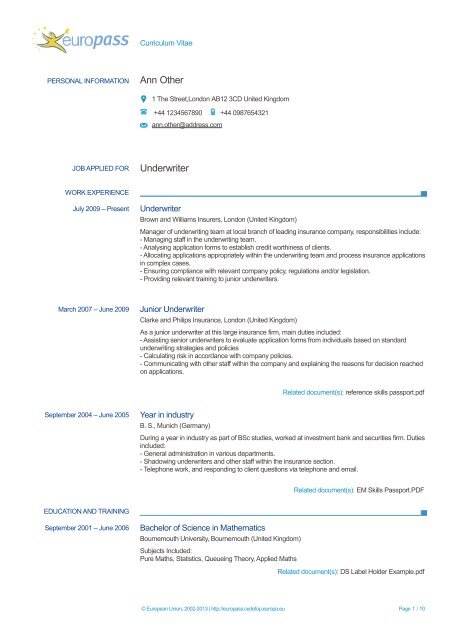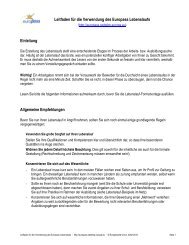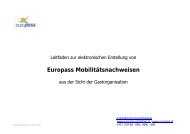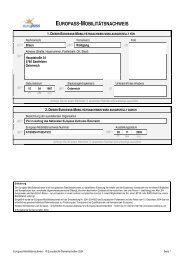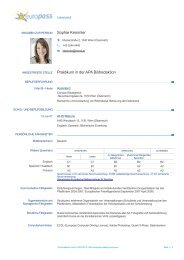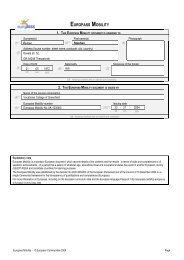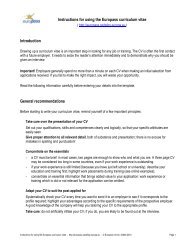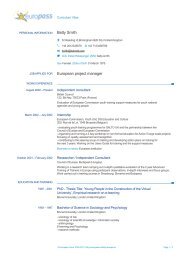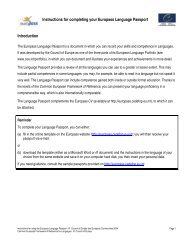English - Europass
English - Europass
English - Europass
Create successful ePaper yourself
Turn your PDF publications into a flip-book with our unique Google optimized e-Paper software.
Curriculum Vitae<br />
PERSONAL INFORMATION<br />
Ann Other<br />
1 The Street,London AB12 3CD United Kingdom<br />
+44 1234567890 +44 0987654321<br />
ann.other@address.com<br />
JOB APPLIED FOR<br />
Underwriter<br />
WORK EXPERIENCE<br />
July 2009 – Present<br />
Underwriter<br />
Brown and Williams Insurers, London (United Kingdom)<br />
Manager of underwriting team at local branch of leading insurance company, responsibilities include:<br />
- Managing staff in the underwriting team.<br />
- Analysing application forms to establish credit worthiness of clients.<br />
- Allocating applications appropriately within the underwriting team and process insurance applications<br />
in complex cases.<br />
- Ensuring compliance with relevant company policy, regulations and/or legislation.<br />
- Providing relevant training to junior underwriters.<br />
March 2007 – June 2009<br />
Junior Underwriter<br />
Clarke and Philips Insurance, London (United Kingdom)<br />
As a junior underwriter at this large insurance firm, main duties included:<br />
- Assisting senior underwriters to evaluate application forms from individuals based on standard<br />
underwriting strategies and policies<br />
- Calculating risk in accordance with company policies.<br />
- Communicating with other staff within the company and explaining the reasons for decision reached<br />
on applications.<br />
Related document(s): reference skills passport.pdf<br />
September 2004 – June 2005<br />
Year in industry<br />
B. S., Munich (Germany)<br />
During a year in industry as part of BSc studies, worked at investment bank and securities firm. Duties<br />
included:<br />
- General administration in various departments.<br />
- Shadowing underwriters and other staff within the insurance section.<br />
- Telephone work, and responding to client questions via telephone and email.<br />
Related document(s): EM Skills Passport.PDF<br />
EDUCATION AND TRAINING<br />
September 2001 – June 2006<br />
Bachelor of Science in Mathematics<br />
Bournemouth University, Bournemouth (United Kingdom)<br />
Subjects Included:<br />
Pure Maths, Statistics, Queueing Theory, Applied Maths<br />
Related document(s): DS Label Holder Example.pdf<br />
© European Union, 2002-2013 | http://europass.cedefop.europa.eu Page 1 / 10
Curriculum Vitae Ann Other<br />
September 1999 – June 2001<br />
A-levels<br />
Awarding Body, London (United Kingdom)<br />
Mathematics - Grade A<br />
Physics - Grade B<br />
Economics - Grade A<br />
General Certificate of Secondary Education (GCSE)<br />
Awarding Body, London (United Kingdom)<br />
Biology - Grade A<br />
Chemistry - Grade B<br />
Economics - Grade A*<br />
<strong>English</strong> Language - Grade A*<br />
<strong>English</strong> Literature - Grade A*<br />
Further Mathematics - Grade A*<br />
French - Grade B<br />
Geography - Grade B<br />
German - Grade A<br />
History - Grade B<br />
Mathematics - Grade A*<br />
Physics - Grade A*<br />
PERSONAL SKILLS<br />
Mother tongue(s)<br />
<strong>English</strong><br />
Other language(s) UNDERSTANDING SPEAKING WRITING<br />
Listening Reading Spoken interaction Spoken production<br />
German B1 B2 B1 B1 B2<br />
GCSE German<br />
French B1 B1 B2 B2 B1<br />
GCSE French<br />
Levels: A1/A2: Basic user - B1/B2: Independent user - C1/C2: Proficient user<br />
Common European Framework of Reference for Languages<br />
Communication skills<br />
Excellent verbal and written communication skills both in an office environment and with external<br />
stakeholders.<br />
Experienced at giving presentations to large audiences.<br />
Good telephone manner<br />
Organisational / managerial skills<br />
Excellent organisational and prioritisation skills.<br />
Computer skills<br />
Proficient with Microsoft Office programmes, Outlook, Internet Explorer and Project.<br />
Also competent with sector specific software packages.<br />
ANNEXES<br />
▪<br />
▪<br />
▪<br />
DS Label Holder Example.pdf<br />
EM Skills Passport.PDF<br />
reference skills passport.pdf<br />
© European Union, 2002-2013 | http://europass.cedefop.europa.eu Page 2 / 10
European Skills Passport<br />
Ann Other<br />
DS Label Holder Example.pdf<br />
9991111 ANNE OTHER BSBAX Produced on 18 December 2008<br />
Bournemouth University<br />
Diploma Supplement<br />
This Diploma Supplement follows the model developed by the European Commission, Council of Europe and UNESCO/CEPES. The purpose of the supplement is to provide sufficient<br />
independent data to improve the international 'transparency' and fair academic and professional recognition of qualifications (diplomas, degrees, certificates etc.). It is designed to provide a<br />
description of the nature, level, context, content and status of the studies that were pursued and successfully completed by the individual named on the original qualification to which this<br />
supplement is appended. It should be free from any value judgements, equivalence statements or suggestions about recognition. Information in all eight sections should be provided. Where<br />
information is not provided, an explanation should give the reason why.<br />
1 INFORMATION IDENTIFYING THE HOLDER OF THE<br />
QUALIFICATION<br />
1.1 Family Name(s) / Surname(s):<br />
OTHER<br />
1.2 Given Name(s) / First Names (s):<br />
ANNE<br />
1.3 Date of Birth (day/month/year):<br />
01/01/1980<br />
1.4 Student identification number or code (if available):<br />
9991111<br />
2 INFORMATION IDENTIFYING THE QUALIFICATION<br />
2.1 Name of qualification and (if appplicable) title conferred:<br />
Bachelor of Science<br />
2.2 Main fields(s) of study for the qualification:<br />
Mathematics<br />
2.3 Name and status of awarding institution (in original<br />
language):<br />
Bournemouth University<br />
2.4 Name and status of institution (if different from 2.3)<br />
administering studies (in original language):<br />
as section 2.3<br />
2.5 Language of instruction/examination:<br />
<strong>English</strong><br />
3 INFORMATION ON THE LEVEL OF THE<br />
QUALIFICATION<br />
3.1 Level of qualification:<br />
Level 6 of the National Qualifications Framework<br />
3.2 Official length of programme:<br />
4 Years<br />
4 INFORMATION ON THE CONTENTS AND RESULTS<br />
GAINED<br />
4.1 Mode of study:<br />
Full-Time with a year in Industry<br />
4.2 Programme requirements:<br />
The specific programme requirements are detailed in the relevant Programme<br />
Specification. The Programme Specification will provide information on the<br />
length of the programme, credit structure, required units of study, intermediate<br />
awards, progression requirements, admission regulations and assessment<br />
regulations. Programme specifications are available via the University website.<br />
www.bournemouth.ac.uk/bologna<br />
4.3 Please see next page for programme details:<br />
4.4 Grading scheme and, if available, grade distribution<br />
guidance:<br />
The grading scheme used by the University is based on percentages. Units are<br />
given a mark between 0-100% with a minimum pass mark of 40% for<br />
undergraduate programmes and 50% for Postgraduate programmes. The<br />
overall classification of the qualification is based upon the final credit-weighted<br />
aggregate mark. Bachelors degrees are classified as 'First Class' for 70% or<br />
more, Second Class, Upper Division' for 60-69, 'Second Class, Lower Division'<br />
for 50-59 and 'Third Class' for 40-49%. All other qualifications (except<br />
Doctorates) are classified as 'Merit' for 60-69% and 'Distinction' for 70% or<br />
more.<br />
4.5 Overall classification of the qualification (in original<br />
language):<br />
Bachelors Degree with Second Class Honours (Lower Division)<br />
5 INFORMATION ON THE FUNCTION OF THE<br />
QUALIFICATION<br />
5.1 Access to further study:<br />
This qualification may lead to study at Level 7 of the National Qualifications<br />
Framework<br />
5.2 Professional status (if applicable):<br />
This programme does not confer any right to practise or professional status<br />
6 ADDITIONAL INFORMATION<br />
6.1 Additional Information:<br />
Year in Industry carried out at:<br />
BEAR STEARNS<br />
3.3 Access requirement(s):<br />
Undergraduate - The minimum requirement for entry is evidence of<br />
achievement to Level 3 of the National Qualifications Framework<br />
6.2 Further information sources:<br />
For further information please refe r to the University website.<br />
www.bournemouth.ac.uk/bologna<br />
© European Union, 2002-2013 | http://europass.cedefop.europa.eu Page 3 / 10
European Skills Passport<br />
Ann Other<br />
9991111 ANNE OTHER BSBAX Produced on 18 December 2008<br />
4.3 Programme details:(e.g. modules or units studied), and the individual grades/marks/credits obtained:<br />
*Marks out of 100% or C - competent, NT - Not Taken or OO - Opt Out<br />
Commencement of Study: 01 October 2001<br />
UNIT REF<br />
UNIT NAME<br />
STAGE<br />
MARKS*<br />
CREDIT<br />
ECTS<br />
CREDIT<br />
A1 PURE MATHS C 64.80 20 10.0<br />
A2 STATISTICS C 62.00 20 10.0<br />
A3 QUEUEING THEORY C 72.50 20 10.0<br />
A4 DATABASE SYSTEMS C 85.00 20 10.0<br />
A5 APPLIED MATHS C 58.60 20 10.0<br />
A6 ACTUARIAL MATHEMATICS C 71.25 20 10.0<br />
BSBAX/C Version 1.2 - Level 4 of the National Qualifications Framework Complete 120 Credits Gained - 69.03 %<br />
B1<br />
STATISTICAL ANALYSIS I 57.40 20 10.0<br />
B2 ADVANCED PURE MATHEMATICS I 56.60 20 10.0<br />
B3<br />
ADVANCED STATISTICS I 60.00 10 5.0<br />
B4 INDUSTRIAL MATHEMATICS I 50.10 20 10.0<br />
B5 BUSINESS MATHS I 58.40 20 10.0<br />
B6 DISCRETE MATHEMATICS I 47.00 10 5.0<br />
B7 MATHEMATICS AND EDUCATION STUDIES I 57.30 20 10.0<br />
BSBAX/I Version 1.2 - Level 5 of the National Qualifications Framework Complete 120 Credits Gained - 55.55 %<br />
PMY18<br />
INDUSTRIAL PLACEMENT (BSBITS)<br />
BSBAX/P Version 1.2 - Placement Year Complete<br />
P<br />
PASS<br />
C1 RESEARCH METHODS H 70.00 40 20.0<br />
C2 KNOTS H 59.30 20 10.0<br />
C3 SECONDARY MATHEMATICS H 43.90 20 10.0<br />
C4<br />
PHILOSOPHY OF MATHS H 43.60 20 10.0<br />
C5 MATHEMATICAL SCIENCE H 58.50 20 10.0<br />
BSBAX/H Version 1.2 - Level 6 of the National Qualifications Framework Complete 120 Credits Gained - 57.55 %<br />
Conferment of Study: 26 June 2006<br />
Bachelor of Science in Applied Mathematics<br />
Overall Award Average = 56.96 %<br />
7 CERTIFICATION OF THE SUPPLEMENT<br />
Contact Details:<br />
Secretary & Registrar<br />
26 June 2006<br />
Bournemouth University<br />
Registry<br />
1-3 Oxford Road<br />
Bournemouth<br />
Dorset<br />
BH8 8ES<br />
Tel: +44(0)1202 961060<br />
web: www.bournemouth.ac.uk<br />
© European Union, 2002-2013 | http://europass.cedefop.europa.eu Page 4 / 10
European Skills Passport<br />
Ann Other<br />
8 INFORMATION ON THE NATIONAL HIGHER EDUCATION SYSTEM<br />
Description of Higher Education in England, Wales and Northern Ireland<br />
In England, Wales and Northern Ireland1, higher education<br />
institutions are independent, self-governing bodies active in<br />
teaching, research and scholarship. They are established by Royal<br />
Charter or legislation and most are part-funded by government.<br />
Higher education (HE) is provided by many different types of<br />
institution. In addition to universities and university colleges, whose<br />
charters and statutes are made through the Privy Council which<br />
advises the Queen on the granting of Royal Charters and<br />
incorporation of universities, there are a number of publiclydesignated<br />
and autonomous institutions within the higher education<br />
sector. Publicly funded higher education provision is available in<br />
some colleges of further education by the authority of another duly<br />
empowered institution. Teaching to prepare students for the award<br />
of higher education qualifications can be conducted in any higher<br />
education institution and in some further education colleges.<br />
Degree awarding powers and the title ‘university’<br />
All universities and many higher education colleges have the legal<br />
power to develop their own courses and award their own degrees,<br />
as well as determine the conditions on which they are awarded.<br />
Some HE colleges and specialist institutions without these powers<br />
offer programmes, with varying extents of devolved authority,<br />
leading to the degrees of an institution which does have them. All<br />
universities in existence before 2005 have the power to award<br />
degrees on the basis of completion of taught courses and the<br />
power to award research degrees. From 2005, institutions in<br />
England and Wales that award only taught degrees (‘first’ and<br />
‘second cycle’) and which meet certain numerical criteria, may also<br />
be permitted to use the title ‘university’. Higher education<br />
institutions that award only taught degrees but which do not meet<br />
the numerical criteria may apply to use the title ‘university college’,<br />
although not all choose to do so.<br />
All of these institutions are subject to the same regulatory quality<br />
assurance and funding requirements as universities; and all<br />
institutions decide for themselves which students to admit and<br />
which staff to appoint.<br />
Degrees and other higher education qualifications are legally<br />
owned by the awarding institution, not by the state.<br />
The names of institutions with their own degree awarding powers<br />
(“Recognised Bodies”) are available for download at:<br />
http://www.dcsf.gov.uk/recognisedukdegrees/index.cfmfuseaction<br />
=institutes.list&InstituteCategoryID=1<br />
Higher education institutions, further education colleges and other<br />
organisations able to offer courses leading to a degree of a<br />
Recognised Body are listed by the <strong>English</strong>, Welsh and Northern<br />
Irish authorities, and are known as “Listed Bodies”. View the list at:<br />
http://www.dcsf.gov.uk/recognisedukdegrees/index.cfmfuseaction<br />
=institutes.list&InstituteCategoryID=2<br />
Qualifications<br />
The types of qualifications awarded by higher education institutions<br />
at sub-degree and undergraduate (first cycle) and postgraduate<br />
level (second and third cycles) are described in the Framework for<br />
Higher Education Qualifications in England, Wales and Northern<br />
Ireland (FHEQ). This also includes qualification descriptors that<br />
were developed with the HE sector by the Quality Assurance<br />
Agency for Higher Education (QAA - established in 1997 as an<br />
independent UK-wide body to monitor the standard of higher<br />
education provision - www.qaa.ac.uk). The FHEQ was self-certified<br />
as compatible with the Framework for Qualifications of the<br />
European Higher Education Area, the qualifications framework<br />
1 The UK has a system of devolved government, including for higher education,<br />
to Scotland, to Wales and to Northern Ireland. This description is approved by<br />
the High Level Policy Forum which includes representatives of the Department<br />
for Business, Innovation and Skills, the Scottish Government, the Welsh<br />
Assembly Government, the Higher Education Funding Councils for England,<br />
Scotland and Wales, the Quality Assurance Agency (QAA), Universities UK<br />
(UUK), GuildHE and the National Recognition Information Centre for the UK (UK<br />
NARIC).<br />
adopted as part of the Bologna Process, in February 2009.<br />
Foundation degrees, designed to create intermediate awards<br />
strongly oriented towards specific employment opportunities, were<br />
introduced in 2001. In terms of the European Higher Education<br />
Area they are “short cycle” qualifications within the first cycle. The<br />
FHEQ is one component of the Credit and Qualifications<br />
Framework for Wales (CQFW). The Qualifications and Curriculum<br />
Authority (QCA), the Department for Children, Education, Lifelong<br />
Learning and Skills, Wales (DCELLS) and the Council for<br />
Curriculum Examination and Assessment, Northern Ireland (CCEA)<br />
have established the Qualifications and Credit Framework (to<br />
replace, in time, the National Qualifications Framework (NQF)).<br />
These authorities regulate a number of professional, statutory and<br />
other awarding bodies which control VET and general qualifications<br />
at all levels. The QCF is also incorporated into the CQFW. There is<br />
a close association between the levels of the FHEQ and the NQF<br />
(as shown overleaf), and other frameworks of the UK and Ireland<br />
(see ‘Qualifications can cross Boundaries’<br />
http://www.qaa.ac.uk/standardsandquality/otherrefpoints/Qualsbou<br />
ndaries09.pdf)<br />
Quality Assurance<br />
Academic standards are established and maintained by higher<br />
education institutions themselves using an extensive and<br />
sophisticated range of shared quality assurance approaches and<br />
structures. Standards and quality in institutions are underpinned by<br />
the universal use of external examiners, a standard set of<br />
indicators and other reports, by the activities of the QAA, and in<br />
professional areas by relevant professional, statutory and<br />
regulatory bodies. This ensures that institutions meet national<br />
expectations described in the FHEQ: subject benchmark<br />
statements, the Code of Practice and programme specifications.<br />
QAA conducts peer-review based audits and reviews of higher<br />
education institutions with the opportunity for subject-based review<br />
as the need arises. The accuracy and adequacy of quality-related<br />
information published by the higher education institutions is also<br />
reviewed. QAA also reviews publicly funded higher education<br />
provision in further education colleges.<br />
Credit Systems<br />
Most higher education institutions in England and Northern Ireland<br />
belong to one of several credit consortia and some operate local<br />
credit accumulation and transfer systems for students moving<br />
between programmes and/or institutions. A framework of national<br />
guidelines, the Higher Education Credit Framework for England,<br />
was launched in 2008. Credit is also an integral part of the CQFW<br />
and the QCF. It may be possible for credit awarded in one<br />
framework to be recognised by education providers whose<br />
qualifications sit within a different framework. HE credit systems in<br />
use in England, Wales and Northern Ireland are compatible with<br />
the European Credit Transfer System (ECTS) for accumulation and<br />
transfers within the European Higher Education Area, and are used<br />
to recognise learning gained by students in institutions elsewhere<br />
in Europe.<br />
Admission<br />
Source: http://www.europeunit.ac.uk/resources/EWNI.pdf, released 1st July 2009 [accessed 8th September 2009]<br />
The most common qualification for entry to higher education is the<br />
General Certificate of Education at ‘Advanced’ (A) level. Other<br />
appropriate NQF level 3 qualifications and the kite-marked Access<br />
to HE Diploma may also provide entry to HE. Level 3 qualifications<br />
in the CQFW, including the Welsh Baccalaureate, also provide<br />
entry, as do Scottish Highers, Advanced Highers or qualifications<br />
at the same levels of the Scottish Credit and Qualifications<br />
Framework. Part-time and mature students may enter HE with<br />
these qualifications or alternatives with evidenced equivalent prior<br />
formal and/or experiential learning. Institutions will admit students<br />
whom they believe to have the potential to complete their<br />
programmes successfully.<br />
© European Union, 2002-2013 | http://europass.cedefop.europa.eu Page 5 / 10
European Skills Passport<br />
Ann Other<br />
Diagram of Higher Education Qualification Levels in England, Wales and Northern Ireland<br />
Framework for Higher Education Qualifications (FHEQ) 5 FQ- Credit<br />
Typical Qualifications Level EHEA<br />
cycle Typical UK Typical ECTS<br />
credit ranges 3<br />
Progression for selection of students<br />
(FHEQ levels)<br />
National Qualifications Framework for England, Wales and<br />
Northern Ireland 6<br />
Typical Qualifications Level<br />
Doctoral Degrees (eg PhD, DPhil, EdD) 8 3 rd<br />
cycle<br />
Masters Degrees<br />
Integrated Masters Degrees<br />
Postgraduate Diplomas<br />
Postgraduate Certificate of Education<br />
Postgraduate Certificates<br />
Bachelors Degrees with Honours<br />
Bachelors Degrees<br />
Professional Graduate Certificate in Education<br />
Graduate Diplomas<br />
Graduate Certificates<br />
Foundation Degrees<br />
Diplomas of Higher Education<br />
Higher National Diplomas<br />
Higher National Certificates<br />
Certificates of Higher Education<br />
7 2 nd<br />
cycle<br />
6 1 st<br />
cycle<br />
5 Short<br />
cycle<br />
Typically not<br />
credit rated 1<br />
4 120<br />
Entry to HE via equivalent experiential or prior learning<br />
1PhD and DPhil qualifications are typically not credit-rated. Newer doctoral degrees, such as the<br />
Professional Doctorate, are sometimes credit rated, typically 540 UK credits.<br />
2A range of 90-120 ECTS is typical of most awards<br />
31 ECTS credit is typically worth 2 UK credits<br />
4The Welsh Baccalaureate Qualification is part of the Credit and Qualifications Framework for Wales<br />
(CQFW)<br />
Typically not<br />
credit rated<br />
180 60-120 2<br />
360 180-240<br />
240 120<br />
5<br />
4<br />
5For students with the necessary prerequisites, entry to each FHEQ<br />
level is possible from the next lower level in the NQF or Framework<br />
for Higher Education Qualifications.<br />
6These levels will also apply to the Qualifications and Credit<br />
Framework (QCF). The QCF will eventually replace the National<br />
Qualifications Framework (NQF)<br />
8<br />
7<br />
6<br />
Vocational Qualifications Level 8 8<br />
Fellowships<br />
NVQ Level 5<br />
Vocational Qualifications Level 7<br />
Vocational Qualifications Level 6 6<br />
NVQ Level 4<br />
Higher National Diplomas (HND)<br />
Higher National Certificates (HNC)<br />
Vocational Qualifications Level 5<br />
Vocational Qualifications Level 4 4<br />
National Vocational Qualification (NVQ)<br />
Level 3<br />
Vocational Qualifications Level 3<br />
GCE AS and A Level<br />
Advanced Diploma<br />
Welsh Baccalaureate Advanced 4<br />
Levels 2, 1<br />
and entry<br />
7<br />
5<br />
3<br />
Section 3.2 further information<br />
Qualification<br />
Full Time<br />
Maximum (years)<br />
Full-Time<br />
Sandwich<br />
Maximum (years)<br />
Part Time<br />
Maximum (years) Qualification<br />
Full Time<br />
Maximum (years)<br />
Full-Time<br />
Sandwich<br />
Maximum (years)<br />
Masters Degree 3 N/A 5 Advanced Diploma 5 N/A N/A<br />
Postgraduate Diploma 2 N/A 3 Diploma of Higher Education 4 4 6<br />
Postgraduate Certificate 1 N/A 2 Diploma in Professional Studies 4 N/A 6<br />
Graduate Diploma 2 N/A 3 Certificate of Higher Education 2 2 4<br />
Graduate Certificate 1 N/A 2 Foundation Degree 4 N/A 6<br />
Bachelor Degree 5 6 8 Higher National Diploma 4 N/A 6<br />
Bachelor Degree (Top-Up) 2 2 4 Higher National Certificate 2 N/A 4<br />
Source: http://www.europeunit.ac.uk/resources/EWNITable.pdf, released 1st July 2009 [accessed 8th September 2009]<br />
Part Time<br />
Maximum (years)<br />
© European Union, 2002-2013 | http://europass.cedefop.europa.eu Page 6 / 10
European Skills Passport<br />
Ann Other<br />
EM Skills Passport.PDF<br />
© European Union, 2002-2013 | http://europass.cedefop.europa.eu Page 7 / 10
European Skills Passport<br />
Ann Other<br />
© European Union, 2002-2013 | http://europass.cedefop.europa.eu Page 8 / 10
European Skills Passport<br />
Ann Other<br />
© European Union, 2002-2013 | http://europass.cedefop.europa.eu Page 9 / 10
European Skills Passport<br />
Ann Other<br />
reference skills passport.pdf<br />
1 The Street, London, AB12 3CD 01234 567890<br />
To whom it may concern<br />
EMPLOYER REFERENCE: ANN OTHER<br />
22 nd April 2013<br />
Ann Other was employed by us between March 2007 and June 2009 as a Junior Underwriter.<br />
Having started in a graduate role, Ann quickly demonstrated her competence and was<br />
promoted to Junior Underwriter after 6 months.<br />
Ann always demonstrated commitment and enthusiasm during her time at the company,<br />
and her technical competence has always been evident. Ann also demonstrated that she is<br />
self-motivated, but also able to work as part of a team.<br />
Ann demonstrated excellent organisation and prioritisation skills.<br />
I would happily recommend her for any future role.<br />
Yours faithfully<br />
Clarke and Philips Insurance.<br />
© European Union, 2002-2013 | http://europass.cedefop.europa.eu Page 10 / 10


